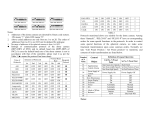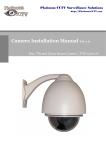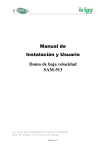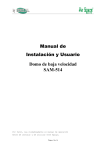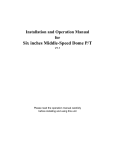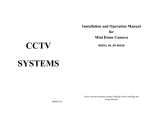Download CiA TVCD606 Technical data
Transcript
Installation and Operation Manual for TVCD606 Please read the operation manual carefully before installing and using this unit 2 I. Points for Attention 1. Before installing the omni bearing intelligent unit, please read the operation manual carefully. 2. The camera takes power supply of DC12V/1.2A. You should assure that the power supply of the product has an input voltage with load about 12V rather than a unload voltage of 12V, otherwise the camera couldn’t work normally. 3. During the process of transportation, storage and installation, the dome should be avoided of incorrect operations such as heavy pressing, strong vibration etc. which can cause damage of product as there are sophisticated optical and electronic devices inside the machine. 4. Do not attempt to disassemble the camera. In order to prevent electric shock, do not remove screws or covers. There are no user serviceable parts inside and only qualified personnel are to service the unit 5. Always follow all electrical standards for safety when it is in operation. Adopt the particular power supply, which is provided with the dome. RS-485 and video signal should keep enough distance with high voltage equipments and cables when they are in transmission. Precautions for anti-lightning and anti-surging should be taken if necessary. 6. The product should be indoor installed and operated to avoid rain and moisture. Do not use it in wet places. If outdoor installation is needed, the closed protect cover should be used and it is absolutely prohibited to use it in open air independently. 7. Do not operate it in case temperature, humidity and power supply are beyond the limited stipulations. 8.Do not let the video camera aim at the sun or the object with extreme light whatsoever it is switched on or not. Do not let the video camera aim at or monitor bright and standstill object for a long time. 9. Do not use aggressive detergent to clean the main body of the video camera. Wipe dirt with dry cloth. If needed, mild detergent can be used suitably. 10. Operate the intelligent high-speed spherical video camera with great care to avoid shock or vibration. It operate incorrectly, machine could be damaged. 11. Install the video camera in the place where endurance should be enough large. 12. Should be dust on the lens, you should wipe it with special lens tissue. 1 II. Description of Functions The dome camera is a hi-tech CCTV product, which incorporates color TV, omni bearing dome P/T and multifunctional decoder into a whole. It can largely reduce connection and installation processes of components in the system, rise up reliability of the system and facilitate installation and maintenance. Therefore it has advantages of beautiful appearance, compact structure and easy operation. 1. Integrated Multi-Protocol Decoder a. With built-up decoder and integrated multi-protocol, it can integrate 16 kinds of communication protocols in maximum. As its baud rate of communication can be adjusted, it is compatible with main domestic and foreign systems by easy setting inside the spherical camera, so it has stronger versatility. b. RS485 serial control: addresses of the dome camera 1-1023. 2. Integrated Omni bearing dome P/T a. Turning 360º horizontally and continuously with unlimited positions. PAN speed range:0~15rad/s (constant speed dome PAN: 15rad/s); turning 0~90º vertically with a speed 0~15rad /s(constant speed dome TILT: 15rad/s). b. Running stably at low speed with super lower noise. Pictures have no shaking. c. the location precision up to ±0.2°. 3. High Intelligent Degree a. Support the dome camera to scan horizontally between two points and scan speed can be modified. b. Data can be stored with powerless memory. 4. Newly-Added Functions a. 5. Flexible and Convenient Application: there are many communication protocols integrated inside the spherical camera and the baud rates can be selected from 24000 bps to 19200 bps. Selectable Optical Zoom Range of Camera Times of Optical Zooming Focus Range Lowest Illuminance 16x f3.9-f6.3 mm 1 Lux (F1.4) 18x f4.1-f73.8 mm 1 Lux (common type) / 0.01 Lux(day & night type) 22x f4-f88 mm 0.2 Lux(F1.6 1/3s) 23x f3.6-f82.8 mm 1 Lux (Common type) / 0.01 Lux(day & night type) 25x f3.6-f90 mm 1 Lux (Common type) / 0.01 Lux(day & night type) 2 III. Settings of Special Camera Before installing the spherical camera, please confirm the communication protocol and baud rate the master controler in the system uses, then set the coding switches on the back of the camera to be identical with that of the system in which SW1 is for address of the spherical camera and SW2 is for communication protocol and baud rate (see attached tables 1,2 and 3). SW1 SW2 ON ON 1 2 3 4 5 6 Pr ot ocol Sel ect 1 2 3 4 5 6 7 8 9 10 Speed Dome Addr ess Sel ect 1 2 3 I D- CODE Set JP 120Ω terminal resistor is opened for RS485 bus 1 2 3 Syst em cont r ol wi r e JP 120Ω terminal resistor is connected on RS485 Bus JP1 is jumper for the terminal resistor JP1 is the 120 Ω terminal resistor for RS485 Bus. When short-circuit terminal is set between “1-2”, the 120 Ω terminal resistor is opened while it is set between “2-3”, the resistor is connected. Take care that on RS 485 Bus only one farthest spherical camera has the terminal resistor connected while other devices should have their terminal resistors opened. z Settings of Addresses of dome Cameras Dome Addres s 1 2 3 4 5 6 7 8 9 10 11 12 13 14 15 16 17 18 … 1023 3 States of Coding Switches DIP1 ON OFF ON OFF ON OFF ON OFF ON OFF ON OFF ON OFF ON OFF ON OFF … ON DIP2 OFF ON ON OFF OFF ON ON OFF OFF ON ON OFF OFF ON ON OFF OFF ON … ON DIP3 OFF OFF OFF ON ON ON ON OFF OFF OFF OFF ON ON ON ON OFF OFF OFF … ON DIP4 OFF OFF OFF OFF OFF OFF OFF ON ON ON ON ON ON ON ON OFF OFF OFF … ON DIP5 OFF OFF OFF OFF OFF OFF OFF OFF OFF OFF OFF OFF OFF OFF OFF ON ON ON … ON DIP6 OFF OFF OFF OFF OFF OFF OFF OFF OFF OFF OFF OFF OFF OFF OFF OFF OFF OFF … ON DIP7 OFF OFF OFF OFF OFF OFF OFF OFF OFF OFF OFF OFF OFF OFF OFF OFF OFF OFF … ON DIP8 OFF OFF OFF OFF OFF OFF OFF OFF OFF OFF OFF OFF OFF OFF OFF OFF OFF OFF … ON DIP9 OFF OFF OFF OFF OFF OFF OFF OFF OFF OFF OFF OFF OFF OFF OFF OFF OFF OFF … ON DIP-1 0 OFF OFF OFF OFF OFF OFF OFF OFF OFF OFF OFF OFF OFF OFF OFF OFF OFF OFF … ON Table 1 For Example: ON ON 1 2 3 4 5 6 7 8 9 10 ON 1 2 3 4 5 6 7 8 9 10 1 2 3 4 5 6 7 8 9 10 Speed Dome Addr ess=1 Speed Dome Addr ess=2 Speed Dome Addr ess=3 ON ON ON 1 2 3 4 5 6 7 8 9 10 Speed Dome Addr ess=4 1 2 3 4 5 6 7 8 9 10 1 Speed Dome Addr ess=18 2 3 4 5 6 7 8 9 10 Speed Dome Addr ess=1023 Notes: 1. Addresses of the dome cameras are denoted by binary code system. ON means “1” while OFF means “0”. 2. Above coded addresses are only from no.1 to no.20. The codes of addresses from no.21 to no.1023 can be deduced by analogue. 3. The range of addresses of the spherical cameras is from 1 to 1023. z Settings of communication protocol of the dome camera (DIP1-DIP4 of SW2) and its default baud rate (DIP5-DIP6 of SW2). In case the default baud rate of the dome camera is not in accordance with that of the controller, please reset it as per the Table 3 (● means the protocol has been done). Type of Protocols Minking A01 Minking B01 Santachi PELCO-D PELCO-P/4800 PELCO-P/9600 PANASONIC Longcomity HUNDA600 LILIN VICON MOLYNX KALATEL VCL DAIWA ALEC Utralk Selection of Protocols Normal Baud Rate DIP-1 OFF ON OFF ON DIP-2 OFF OFF ON ON DIP-3 OFF OFF OFF OFF DIP-4 OFF OFF OFF OFF OFF OFF ON OFF ON OFF ON OFF ON OFF ON OFF ON OFF ON OFF ON ON OFF OFF ON ON OFF OFF ON ON ON ON ON OFF OFF OFF OFF ON ON ON ON OFF OFF OFF ON ON ON ON ON ON ON ON DIP-5 ON OFF OFF OFF ON OFF OFF OFF OFF ON ON OFF ON OFF OFF OFF OFF DIP-6 OFF ON ON OFF OFF ON ON ON ON OFF OFF ON OFF ON ON ON ON Integrated Protocol ● ● ● ● ● ○ ● ● ○ ○ ○ ○ ○ ○ ○ ○ Table 2 Protocols mentioned above are suitable for the dome camera. Among them “Santachi”, “ PELCO-D” and “PELCO-P” have no corresponding orders for some special functions in the protocols. In order to control some special functions of the spherical camera, we make some functional transformation upon some common orders. Normally we take “Call Preset Position / Set Preset position” to transform, and contents of order transformation are listed below. 4 Number Control Object of N Value 51 Supplementary Control of 52 dome 53 Power Supply of Camera 54 Definition of Keypad Operation Call No. N Preset Point Start Scan (low Speed) Start Scan (middle Speed) Start Scan (high Speed) Power Supply On Set No. N Preset Point Start Patrol Set Start Position of Scan Set End Position of Scan Power Supply Off 55 56 BLC On Off Zero Illuminance On Off 57 Screen Display * On Off 58 D-Zoom On Off 59 Focus Automatic Manual 60 Iris Automatic Manual Automatic Manual Interior Exterior ATW One Push WB 61 62 Mode of White Balance * 63 64 Notes: 1. Those Items with “*” have memory function even the dome is switched off. 2. For those cameras with “menu”, you can use “Screen Display ON” to control the Menu ON/OFF, and use “Screen Display OFF” to control Screen Display ON/OFF. 3. For those cameras which have no “Zero Illuminance” or the function of “Zero Illuminance” is automatically switched without control, then above “Zero Illuminance” is invalid. 4. Notes to “Patrol” Function of the dome camera: ① Automatically scan from no.1 to no.16 preset points one by one. If some points do not have been preset or are cleared out after presetting, they will be bypassed when patrol is carrying out. ② The dwelling time between to preset points is 4 seconds. ③ The “Patrol” function of the dome camera can be carried out by presetting no.51 position. 5. Notes to “Scan(auto pan)” Function of the dome camera: ① The dome camera makes automatic scan between two specified positions. ② The speeds of scan are divided into three levels. You can call no. 51, 52 and 53 preset position to start scan at speed of 1.5°/ sec, 5°/ sec and 10°/ sec separately. ③ The dwelling time between the “Start Point” and “End Point” of scan is 3 seconds. 6. All notes mentioned above are supplementary descriptions under high speed. All original operations of the control system are unchanged. z 5 Settings of Communication Baud Rate of the dome Camera Coding Switch Baud Rate 2400 bps 4800 bps 9600 bps 19200 bps 1 2 3 4 5 OFF ON OFF ON 6 OFF OFF ON ON IV. Steps of Installation 1. Mounting Base 2. 3. 4. 5. 6. Outer Tube Shading Cover Outer Cover Camera Connecting Cable Dimension Drawing 1. Carefully read the operation manual and the points for attention. 2. Carefully set the communication code, baud rate and address of the dome camera and make confirmation they are correct. 3. Take out the plug of the dome camera and connect external power supply, RS485 and video wires as per marks on the plug. Take care that the power supply of the dome camera is DC12V/1.2A and adopt the particular power supply which is provided with the dome camera. Red : DC12V+ Black : GND Orange : RS485+ Yellow: RS485VIDEO . 4. Take out the mounting base from the spherical camera, thread the connecting wire from behind through the central hole of the base. Fix the base by three screws on the ceiling as per the drawing, and connect the wire with the ball. Aim the latch in the ball with the notch on the base as per the drawing, and mount the ball upward to the position and turn it clockwise until the spring sheet on the base takes effect. In case the wire could not come out from behind the ceiling, you can open a hole on the edge of the casing for running of the wire. 6 Installation Drawing V. Main Technical Data Specifications Camera Function Lens Data 7 Image Inductor Effective Pixels Synchronous System VF Output White Balance Power Supply Power Consumption Weight Mounting Style Relative humidity Operation Temperature Scan System Horizontal Resolution Signal / Noise ratio Electronic Shutter Lowest Temperature Zooming Range 1/4″Color CCD 752H×582V(440000pixels) Internal Synchronization Compound Signal 1.0Vp-p/75Ω Automatic/Manual DC12V±10% 1.2A 12VA 2Kg Ceiling or ceiling hanging style 10-75%(under no condensing) 0℃~40℃ 15.625KHz(H) 50Hz (V) 480 TV lines Larger than 48 db 1/3~1/10000 seconds 1Lux,AGC ON 18×Optical and 12×Digital PAL Basic Functions of Spherical Camera Iris Focus Horizontal Turning Vertical Turning Preset Positions Patrol Function Automatic/Manual Automatic/Manual 0--15°/s (constant P/T: 15°/s fixed) 0--15°/s (constant P/T: 15°/s fixed) 64 presets (max) At best 6 cruises VI. Analysis of Normal Troubles Problems No action and images when power is switched on Abnormal self-inspection. Images with roaring sound of the motor Normal self-inspection but no images Successful self-inspection but out of control Possible Causes Power supply damaged or insufficient power Wrong connection of power supply Faults in engineering circuits Mechanical fault Tilting camera Insufficient electrical power Wrong connection of VF circuit Bad connection of VF circuit Camera damaged Wrong connection of control signal wire Mismatched address of spherical camera Mismatched protocol Images unstable Bad connection of VF circuit Insufficient electrical power Abnormal self-inspection Bad connection of control wire Problems on main frame Dome Camera out of control Too heavy load or longer distance of communication Remedies Replace Correct Remove Repair Place uprightly Replace with qualified power supply and let it close to the spherical camera Correct Remove Replace Correct Reselect Adjust protocol to match with the controller and switch on again Remove Replace Switch on again Remove Switch on the main frame 1. Connect 120Ω resistor to the farthest camera and let other cameras to be broken; 2. Increase code distributor. Normal problems and their causes and remedies mentioned above are only for reference. Should you meet other special problems, you can ask for technical support from your dealer directly. 8










